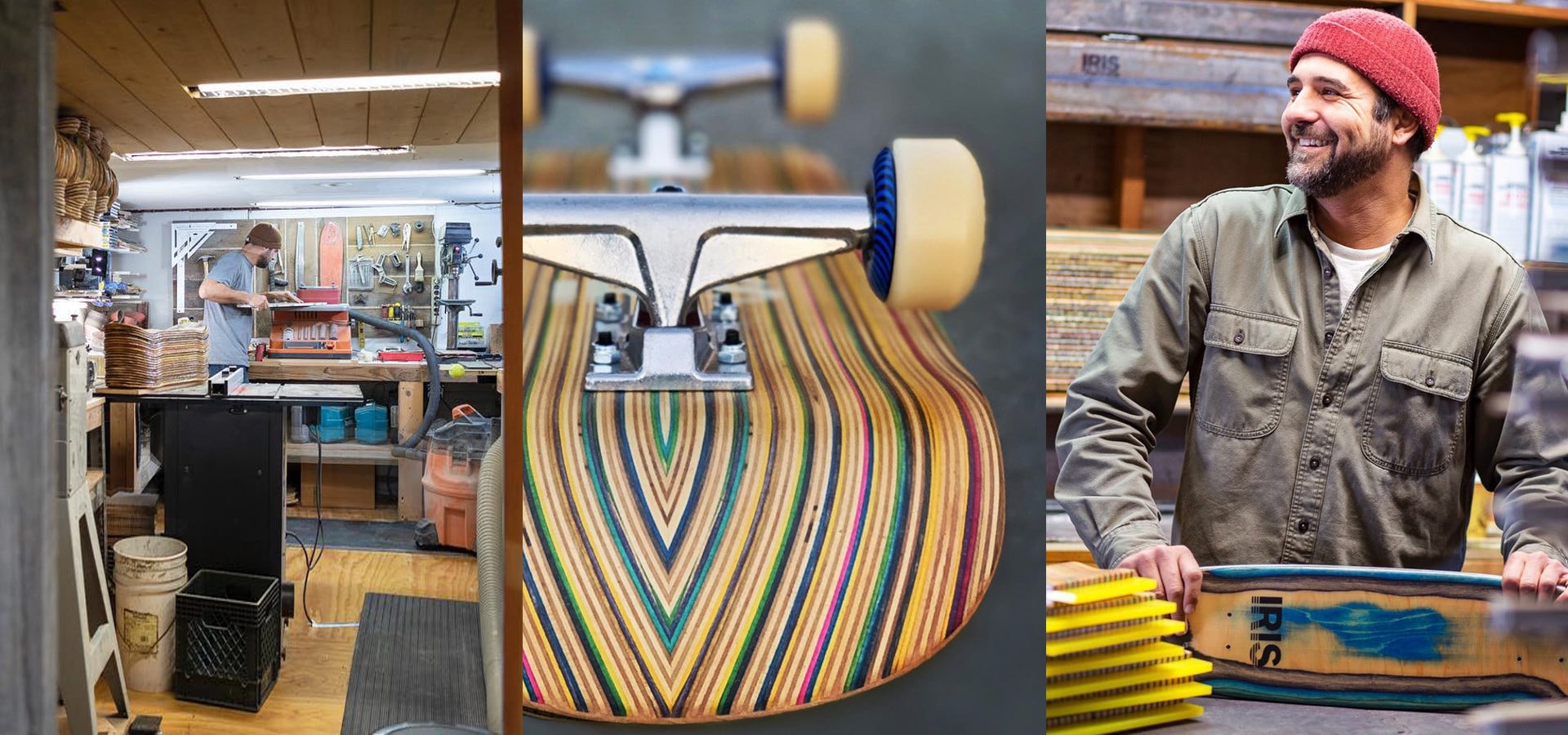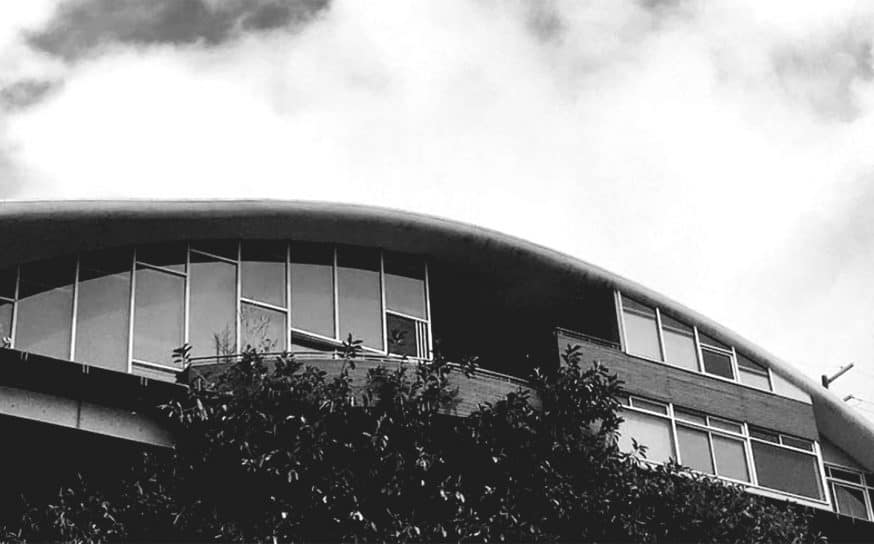A Lifelong Skater Transforms Recycled Skateboards Into Functional (and Rideable) Works of Art
The rainbow connection.
-
CategoryArtisans, Arts + Culture, Makers + Entrepreneurs, Sustainability, Visual Art
-
Written byShaun Tolson
Twelve years ago, George Rocha was struck with a lightning bolt of inspiration.
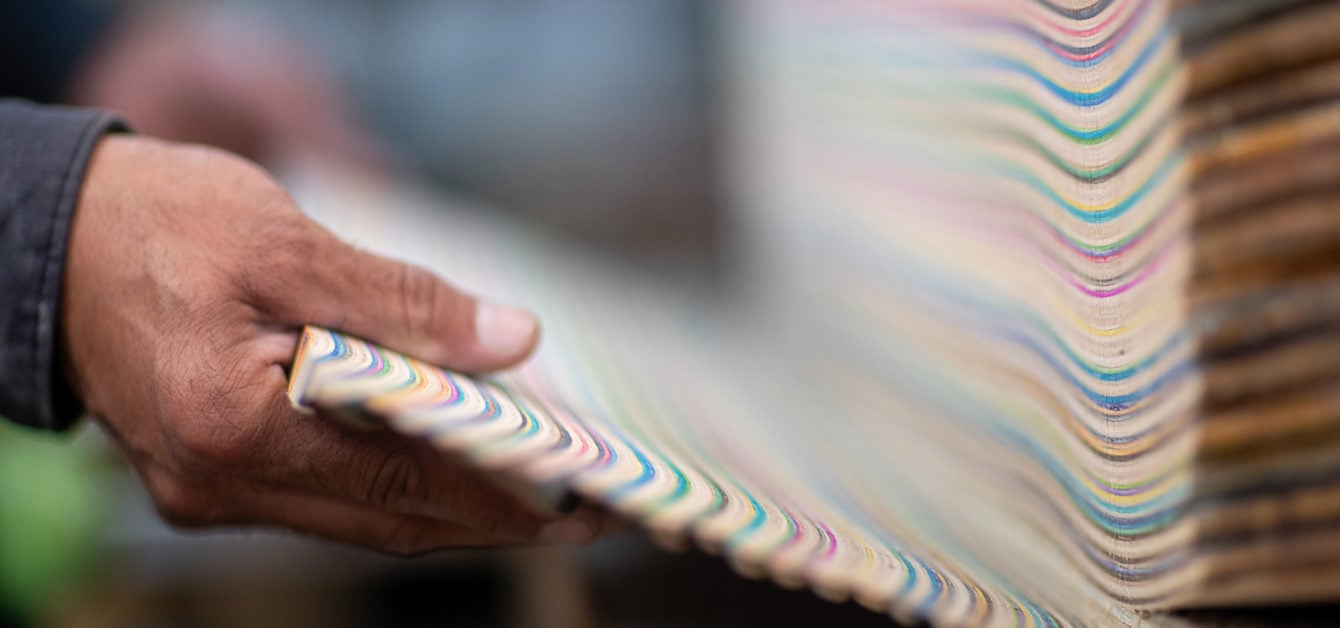
That revelation took form the moment Rocha saw the sculptural artwork made by Haroshi, a Japanese artist and skateboarder, who used recycled skateboard decks as the medium for his signature wood carvings. Rocha, who learned to skateboard when he was five years old while living in Rhode Island and has skated pretty much every day since (he’s now 46), immediately began to think of functional pieces of artwork that he could create in a similar fashion.
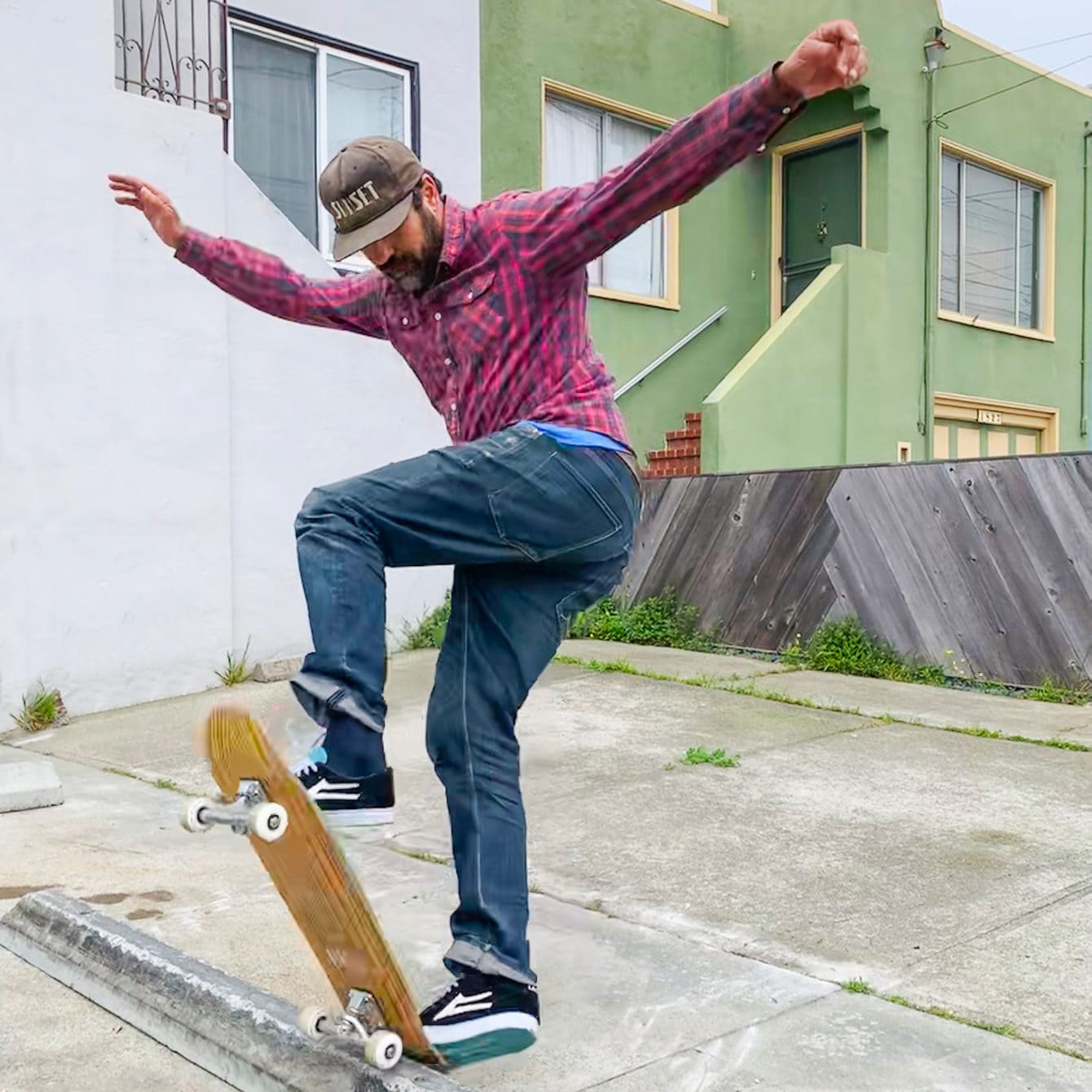
Rocha was raised with a handyman’s mentality, and he acknowledges that he was always at his best creating functional objects—things that served a purpose. “Everything is about skateboarding to me,” he says. Not surprisingly, Rocha’s brainstorming session led to the idea that he should fashion a skateboard made from the broken-down decks of retired boards. Consider it the skateboard circle of life. In that moment, Iris Skateboards was born, though it would be another two years before Rocha formalized the San Francisco business—and it required almost that same amount of time for Rocha to come up with the business’s name (more on this later).
“I don’t just want to make stuff out of skateboards just for the sake of doing it. If it’s not aesthetically pleasing and serves a function then I won’t do it.”
Though he originally considered building a complete skateboard, one that included trucks and wheels, Rocha soon found that he was having so much fun making the board itself that he decided to focus solely on that. “I’m more of an industrial designer at heart,” he says, “so I just ran with the skateboard concept.”
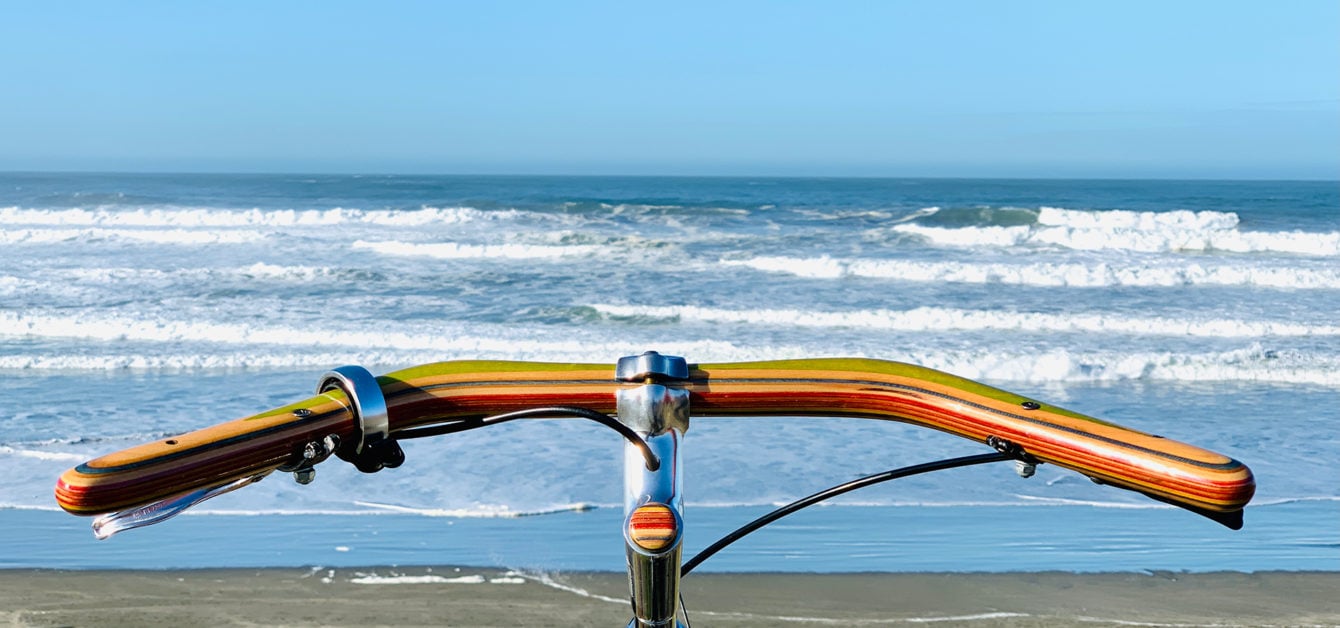
At the same time, however, Rocha also made a few sculptural pieces, including a three-dimensional heart that would serve as a gift for his girlfriend at the time. Since then, Rocha has made about a dozen heart sculptures, including a handful that were carved for charity auctions, but he rarely dabbles in sculptural commissions—in part because he’s drawn more to creating functional artwork and also because he doesn’t want to venture too close to Haroshi’s work that initially drew him into the craft. “I’m not a fan of jumping on somebody else’s concept. I respect people’s lanes like that,” he says. “I also don’t want to create a show and call myself a sculptor. When I make sculpture pieces, I give them to a person. They’re very deliberate and private.”
In almost the same instant that Iris’s recycled skateboards were born, Rocha also took on a few custom furniture commissions, including a countertop for Aqua Surf Shop just a few blocks from San Francisco’s Ocean Beach. He also crafted four dining tables for HopSaint Brewing Company in Torrance. “It was a baptism by fire,” Rocha recalls of the commission to build those dining tables, but he wasn’t worried. “Growing up in a Portuguese household, we were taught to do everything,” he explains, “so I had a concept and a level of comfort of working with many different tools.”
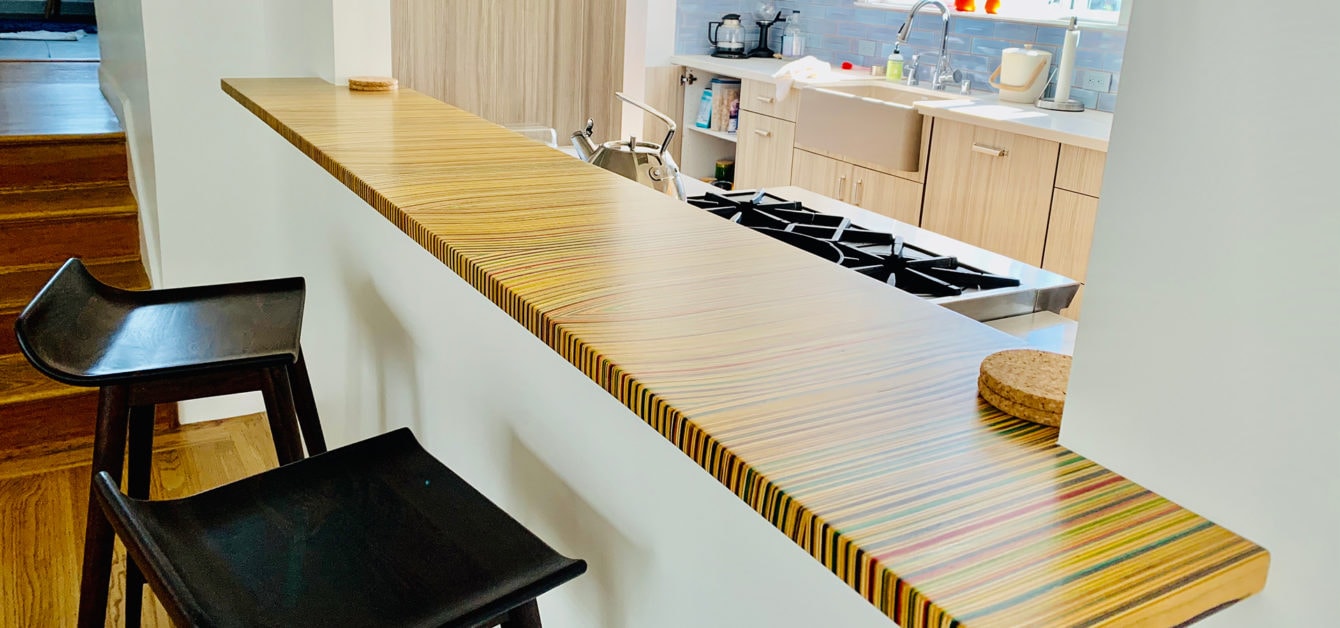
Rocha also had an innate interest in furniture design, which manifested itself years earlier when he crafted a futuristic, unibody rocking chair from dozens of sheets of plywood. With the success of that rocking chair project in his mind, Rocha confidently accepted the commission knowing that he could figure out how to best adapt his skateboard-building process to produce restaurant-quality dining tables instead.
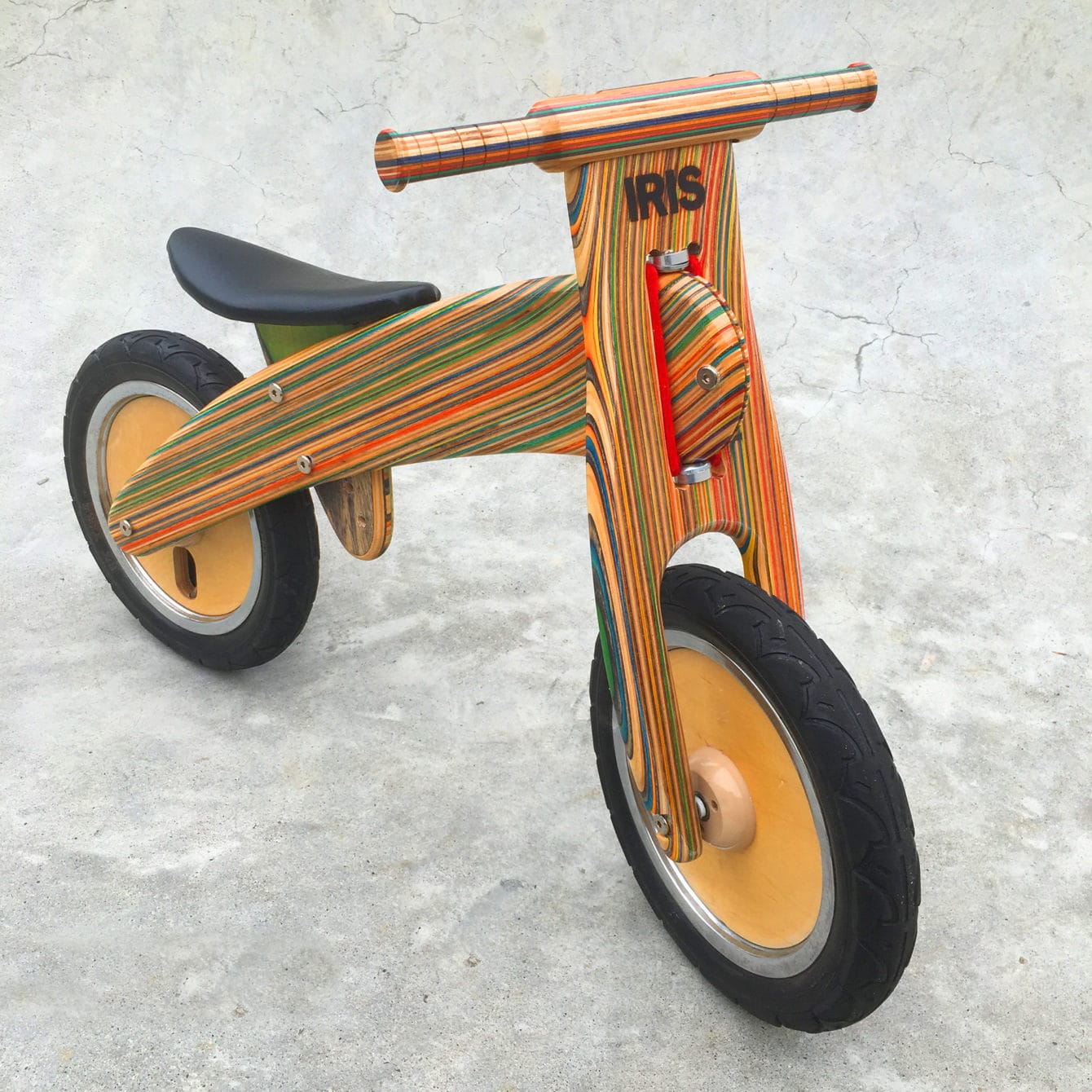
The first skateboards that Rocha built for himself a dozen years ago were flat cruiser boards with a signature rainbow colorway and a distinctively retro aesthetic that evoked 1970s style. Every day that Rocha would ride them around his neighborhood, someone new would stop to ask him about the board and where he acquired it. “The public response was the whole reason I even went into business,” he says. “You have to have the confidence to know it’s something viable and worthy of your time to legitimize it.”
By determining that the business had legitimate potential and staying power, Rocha had cleared the first of many hurdles. But he still needed a compelling and effective name for his company and brand.
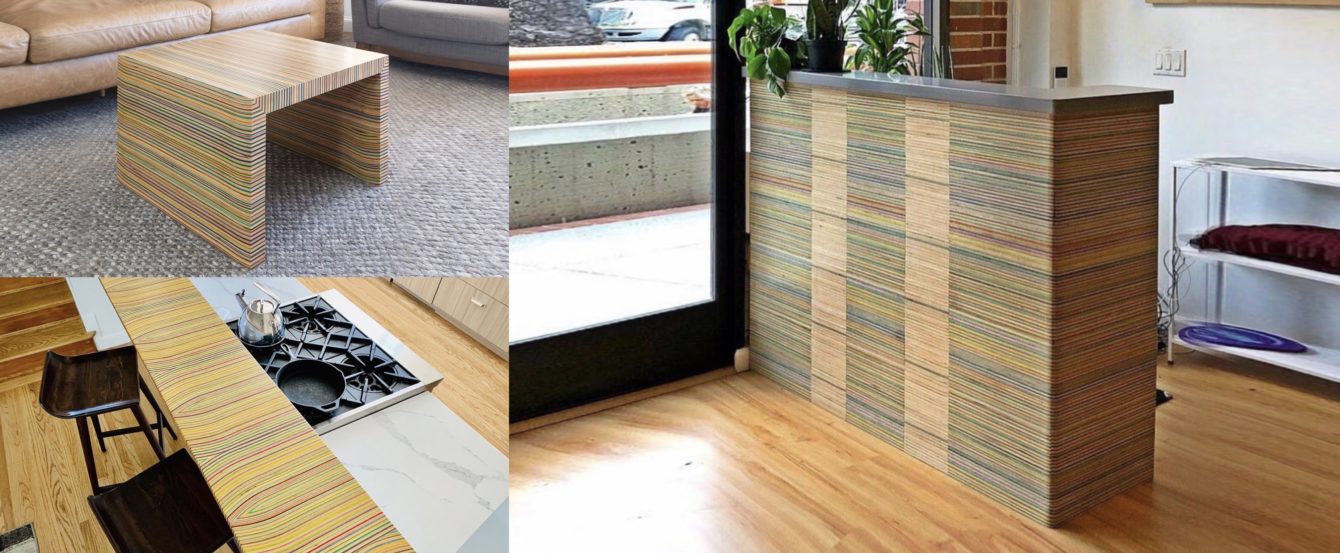
Even after months of soliciting suggestions from his skateboarding friends, Rocha had no good ideas. At the eleventh hour, as pressure to finalize the moniker of his enterprise reached its zenith, Rocha recalled learning that Nike’s brand name was a reference to the Greek god of victory. Recognizing that his recycled boards had a distinctive rainbow aesthetic, Rocha researched Greek mythology and discovered that Iris was the goddess of the rainbow and the messenger of the gods. Based on his own Portuguese heritage, Rocha also knew that the Portuguese word for rainbow was arco iris. With those two discoveries, the answer was suddenly clear and Iris Skateboards was incorporated in 2012.
Two years later, Rocha was offered a golden opportunity. The Canadian documentary television series How It’s Made wanted to feature Rocha’s boards, and even though the show would reveal some of the steps in Rocha’s process—broadcasting it to U.S. audiences via the Science Channel—Rocha accepted almost immediately. The prospect of the rest of the world learning the basics to do what he does did not deter the then-39-year-old entrepreneur. “I’m not that benevolent where I was thinking, ‘I want to teach the world this,’” he says. “But I realized that if I wanted the world to see my craft, I had to bare myself. If to show my work meant that I had to show a bit of the how, then I was willing to accept that. There’s no secret ingredient to what I do.”
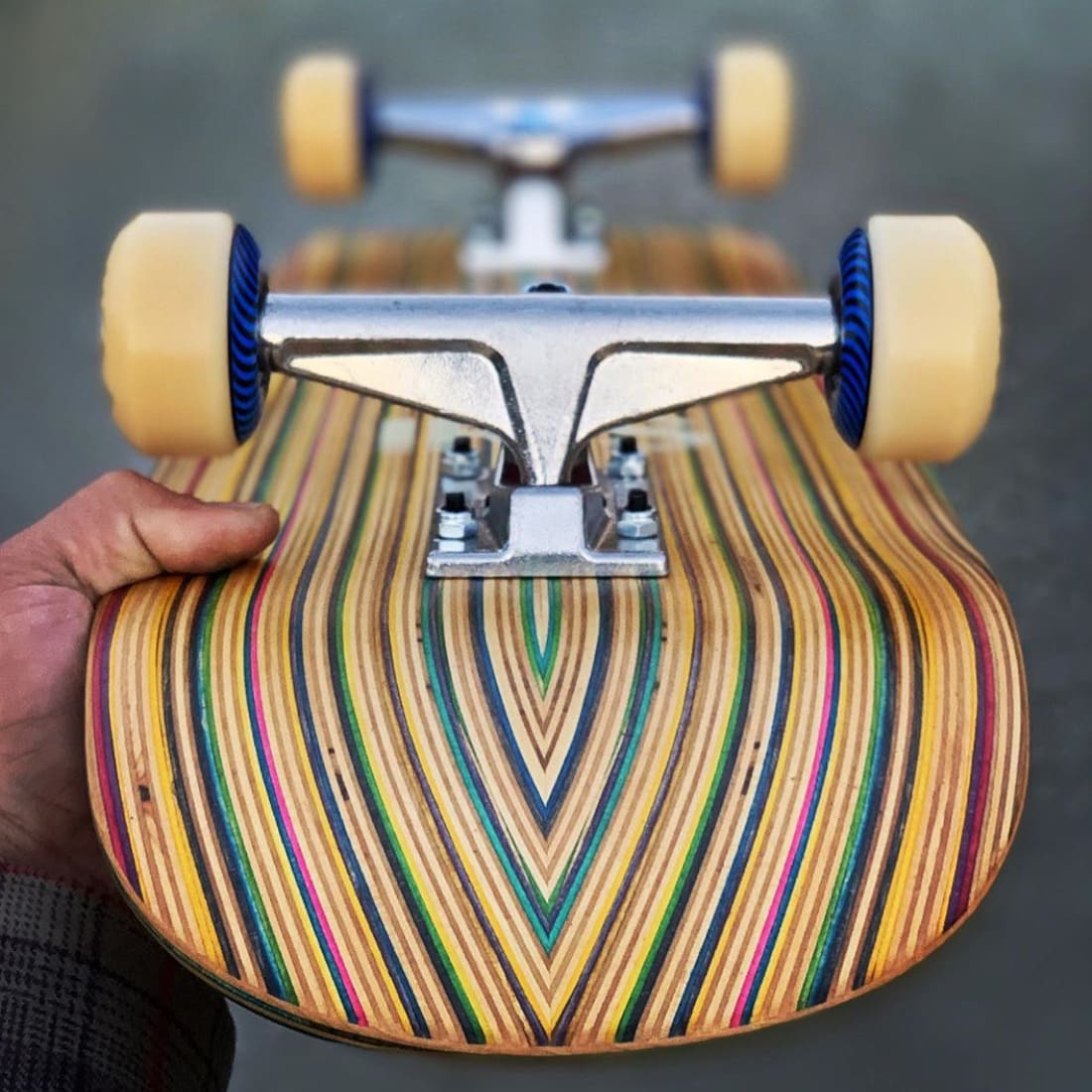
In the immediate aftermath of the episode airing in early December 2014, Rocha fielded orders for about 50 boards a month—demand that remained constant through the end of the following summer. Ever since, Rocha receives messages almost every month from skateboard artists or recycled skateboard builders who reveal that they got into the craft by first watching that episode of How It’s Made.
As for how Rocha makes his boards, not much has changed in the almost 10 years that Iris has served as Rocha’s primary occupation. Just as it was in the beginning, Iris Skateboards remains a one-man operation; though over time, the entirety of Rocha’s garage has consumed the necessary machinery involved. In that respect, Rocha has excelled at playing a real-life version of the game Tetris—finding ways to squeeze in new, industrial-strength power tools to maximize the area of his work space. “My superpower is learning how to make things more efficient,” he says. “My shop is only 700 square feet but it packs a punch.”
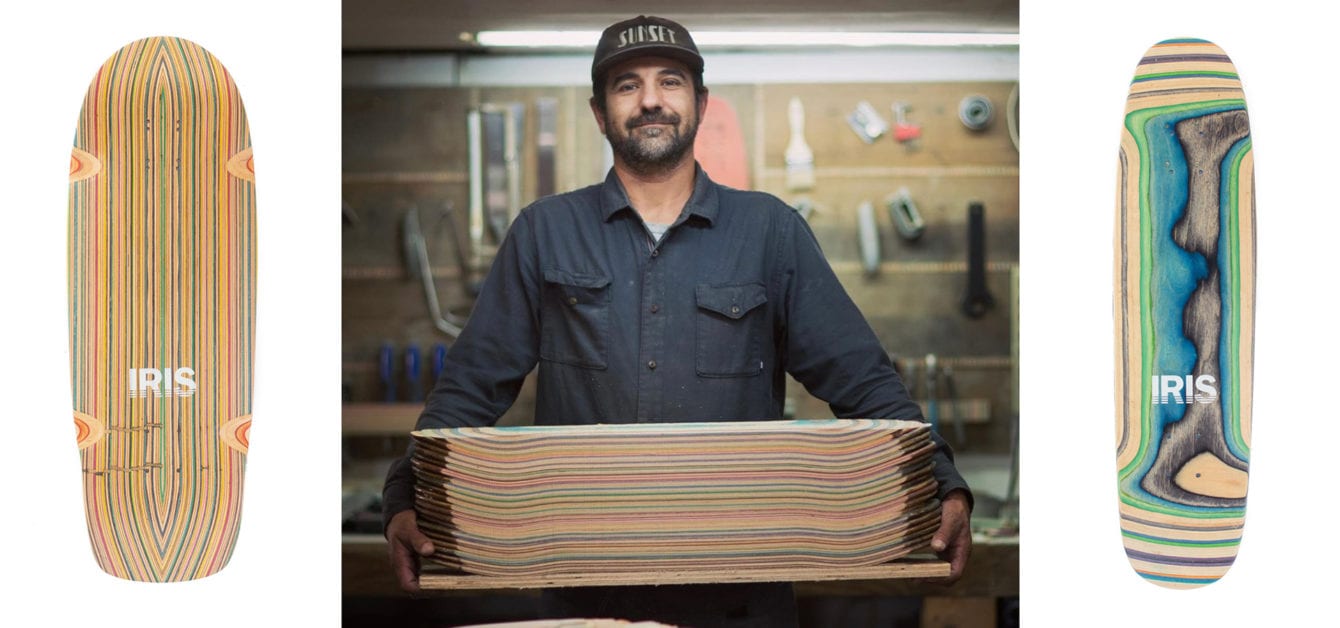
Over the course of a year, Rocha brings in between 1,500 and 2,000 broken-down boards, which he collects from local skate shops who would otherwise throw them away. “There’s a lot of skateboarders in San Francisco, and they go through a lot of decks,” he says. “Still, there’s always a need to recycle them, so it’s my duty to go get them.”
In terms of volume, Iris’ new skateboard decks, which all cost $150, represent the company’s greatest commodity. Now that Rocha is pressing limited-edition, concave boards—releasing new shapes every six months or so—those decks are the most sought-after pieces and they’ll sell out in a matter of days, sometimes in less than 10 minutes.
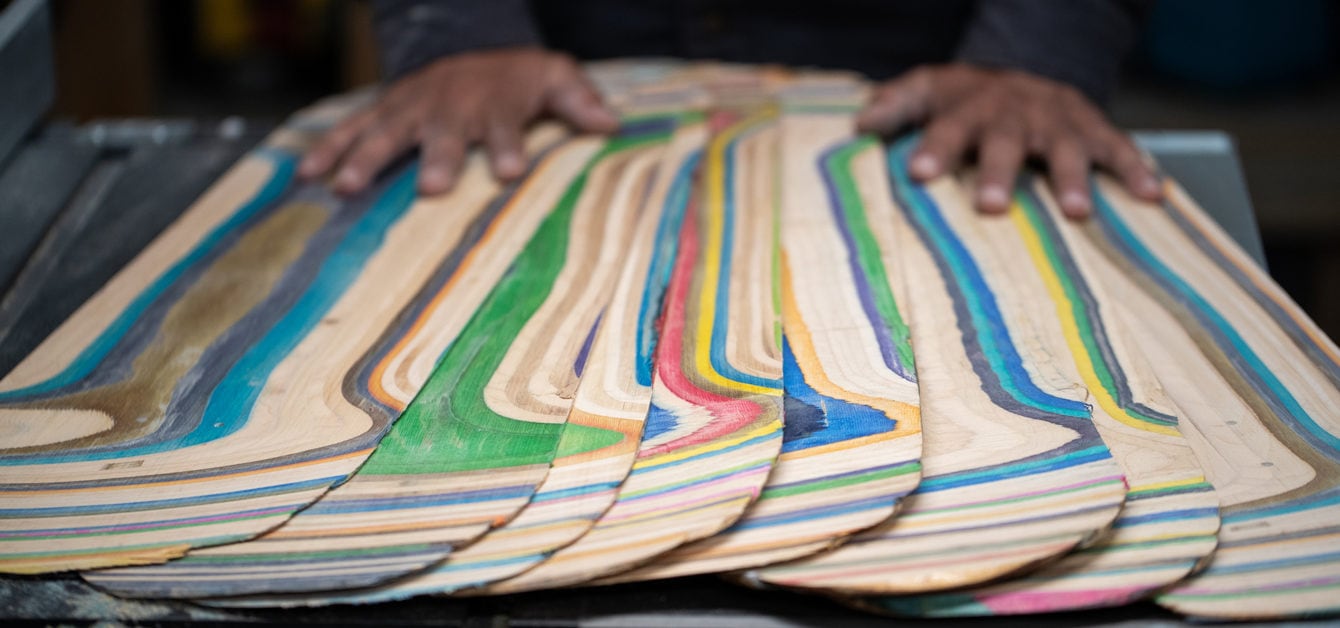
From a revenue standpoint, however, Rocha’s custom furniture leads the way. Stools typically cost $200 per piece; a coffee table starts at about $1,500; and other, larger pieces carry price tags that eclipse several thousand dollars. “A lot of my furniture projects feel like collaborations,” he says. “I talk to the client and want to know what they’re about, what function the piece is going to serve, where it’s going to be in the house, and then the layout of the room and dimensions. I play with not just the colors but the shapes. It keeps it from feeling stale and keeps me from feeling like I’m a manufacturer.”
Rocha has even dabbled in surfboards, creating a dozen or so several years ago with the help of a friend. Even though Rocha acknowledges that there’s not as much crossover between skateboarding and surfing as many people might think, he’s open to making surfboards a more regular facet of his business. “I’m still meaning to find a local shaper to work with,” he says, “to keep it [Iris surfboards] alive on a small scale.”
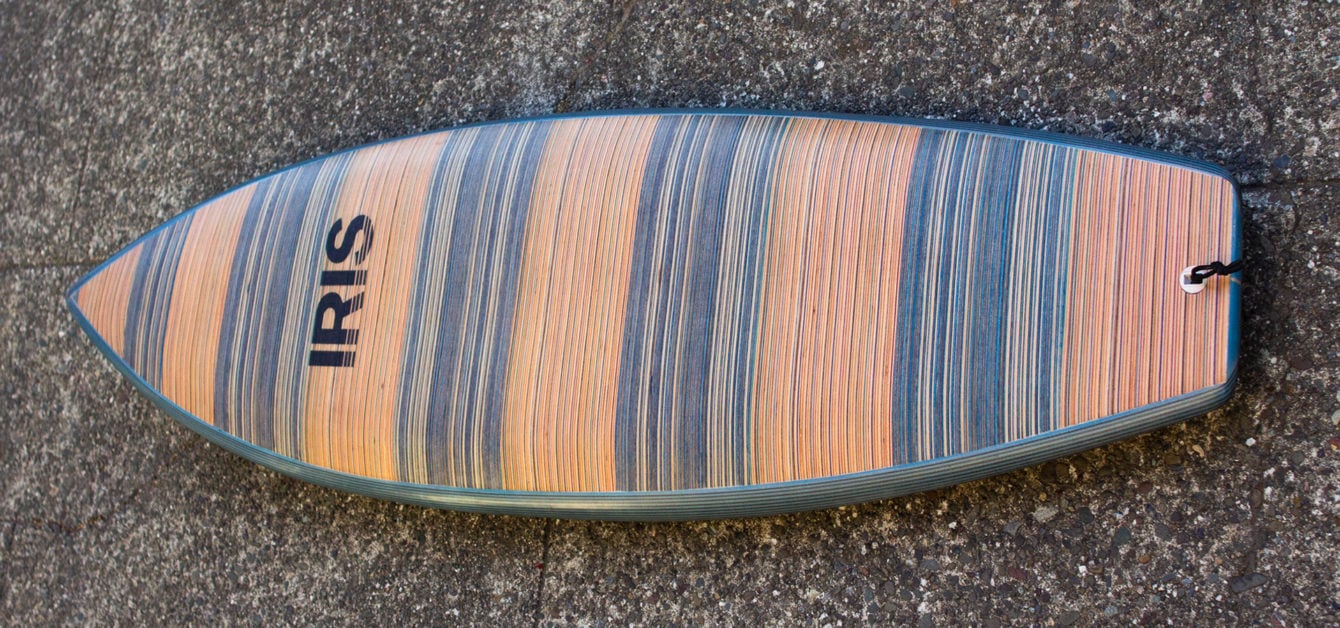
Because Rocha is so busy, he seldom has time to dream up what he might like to create next. Similarly, he won’t take on just any special request. “You have to pique my interest. You have to wow me,” he declares. “I don’t just want to make stuff out of skateboards just for the sake of doing it. If it’s not aesthetically pleasing and serves a function then I won’t do it.”
And even though Rocha is as busy as he is, seemingly always engaged in some activity or task related to his job, he’s one of the lucky few who never feels like he’s working. “I don’t consider it workaholic syndrome when I have so much fun doing it,” he says. “Deep down inside I’m a skate rat who still loves everything to do with skateboarding. I’m a skateboarder at heart.”
For Modern Architects, the Future Lived in Southern California
Wait, the Jetsons lived in Palm Springs?
Friday Finds: Camping Essentials for California Dads
Gift ideas for Father’s Day.
Get the Latest Stories




